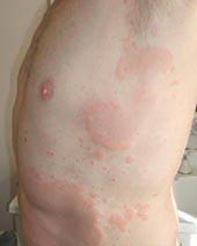Peer Reviewed
Feature Article Immunology and allergy
Managing urticaria
Abstract
The key points in the management of patients with urticaria are to classify the nature of the urticaria and to identify the possible triggers. Despite many advances in understanding the pathophysiology of the condition, antihistamines remain the mainstay of treatment.
Key Points
- Acute urticaria tends to have identifiable triggers.
- A careful history to identify possible triggers is the most useful diagnostic tool in patients with new-onset urticaria.
- A trigger or cause is not found in most patients with chronic urticaria despite extensive investigations.
- Chronic urticaria caused by physical triggers can be identified by history alone and rarely needs any further investigations (with the exception of cold urticaria, where investigations for an underlying cause is necessary).
- It is essential to differentiate chronic urticaria with angioedema from angioedema without urticaria and from urticarial vasculitis as these conditions are associated with different underlying pathology.
- Investigations should be tailored to individual patients.
- Antihistamines are the mainstay of treatment for urticaria.
Purchase the PDF version of this article
Already a subscriber? Login here.

